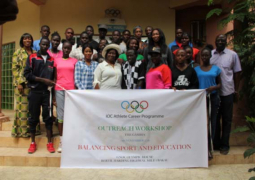"Women and men united to end violence against women and girls"
Female Lawyers Association - Gambia, share the said theme, nationally by the Chair of the Publication Committee
Introduction
Annually, International Women's Day is observed and celebrated around the world on the 8th of March, by individuals, governments and women's organisations. This day highlights the growth and achievements of women in the developed and developing world. Events are held to honour women's various advancements but at the same time, it serves as a reminder to all, of how much more needs to be done to improve and maintain women's equality in all aspects of life and the need to continue being vigilant towards the same goal.
This day also brings into focus the need to better all aspects of a woman's life in society, be it economical, political or social. The Government of the Republic of The Gambia as well as domestic and international Non-Governmental Organisations have to be commended for the efforts and work carried on in the promotion and protection of women in our societies.
International Women's Day started at birth as a socialist movement across the United States and Europe in the 1900s. By the mid 1900s, it became a global phenomenon, and it continues to grow and be recognised not only by the women, but by men too.
However, the reality is that on a global scale, women are still not paid equally to that of their male counterparts, women still are not present in equal numbers in business or politics, and women's education, health and the violence against them is worse than that of men. We cannot forget that women have achieved and improved themselves over the years. Women are going to universities, women can work and still have and raise a family, women are astronauts, engineers, judges, prime ministers, politicians and even presidents. Africa, has been the first to see a woman president. Leading Countries such as the United States have had women leading political campaigns for presidency. Our very own Secretary of State for Women's Affairs is the Vice President of the Republic of The Gambia.
The aim of FLAG is to make women more aware of their rights that have already been afforded to them by disseminating information, through advocacy and advice. FLAG is proud to be associated with the ongoing national efforts to domesticate the two major international Bill of Rights on Women's Rights (CEDAW and The African Protocol) that have been signed by our Government.
Global Theme
This year, the United Nation has identified this article's title as the main running theme for International Women's Day.
The United Nations defines "violence against women" as "any act of gender-based violence that results in, or is likely to result in, physical, sexual or mental harm or suffering to women, including threats of such acts, coercion or arbitrary deprivation of liberty, whether occurring in public or in private life". Violence against women takes many forms, from the overt to the subtle. WHO has adopted the following definitions of violence:
Physical violencemeans a woman has been slapped, or had something thrown at her; pushed, shoved, or had her hair pulled: hit with a fist or something else that could hurt; choked or burnt; threatened with or had a weapon used against her.
Sexual violence means a woman has been physically forced to have sexual intercourse: had sexual intercourse because she was afraid of what her partner might do; or forced to do something sexual she found degrading or humiliating.
Emotional violence does not yet have a widely accepted definition, but includes, for example, being humiliated or belittled; being scared or intimidated purposefully.
Intimate-partner violence (also called "domestic" violence) means a woman has encountered any of the above types of violence, at the hands of an intimate partner or expartner; this is one of the most common and universal forms of violence experienced by women
Statistics
In a 10-country study on women's health and domestic violence conducted by WHO: - Between 15% and 71% of women reported physical or sexual violence by a husband or partner.
- Many women said that their first sexual experience was not consensual. (24% in rural Peru, 28% in Tanzania, 30% in rural Bangladesh, and 40% in South Africa).
- Between 4% and 12% of women reported being physically abused during pregnancy.
- About 5,000 women are murdered by family members in the name of honour each year worldwide.
- Trafficking of women and girls for forced labour and sex is widespread and often affects the most vulnerable.
- Forced marriages and child marriages violate the human rights of women and girls, but they are widely practiced in many countries in Asia, the Middle East and
sub-Saharan Africa.
- Worldwide, up to one in five women and one in 10 men report experiencing sexual abuse as children. Children who experience sexual abuse are much more
likely to encounter other forms of abuse later in life.
Consequences of such Violence
The effects of violent acts against women are wide. It is a major obstacle to development. Violence against women in particular hinders progress in achieving development targets. Despite the growing recognition of violence against women as a public health and human rights concern, and of the obstacle it poses for development, this type of violence continues to have an unjustifiably low priority on the international development agenda and in planning, programming and budgeting.
many options for addressing violence against women.
Various studies have shown that poverty and hunger provides and opportunity to ally with violence against women. Therefore, more evaluation is needed to assess the effectiveness of violence prevention measures; interventions with promising results include increasing education and opportunities for women and girls, improving their self-esteem and negotiating skills, and reducing gender inequities in communities is needed. FLAG believes that advocacy for victims, better awareness of violence and its consequences among health workers, and wider knowledge of available resources for abused women (including legal assistance, housing and child care), can lessen the consequences of violence.
FLAG urges men and women, individually and in groups/organisations, to collaborate to reduce violence against women throughout the nation, We must identify the scope and types of violence in different settings and acknowledge, first and foremost, that the magnitude and nature of the problem is global and not only prominent in our society. We must work on developing guidance principles for health professionals, welfare offices, police officers and other security personnel to prevent and strengthen the health sectors responses to violence and the security forces preventive responses and measures.
FLAG undertakes to continue to disseminate information on a national level and support the already place national efforts to advance women's rights and prevent violence. FLAG will also continue to collaborate with the international agencies and organizations set up and running for years to deter violence against women globally.
As an Association, FLAG will not relent until it sees the passage and enactment of the Women's Bill into law, and other legislative initiatives geared towards the enhancement of the welfare and legal status of women and children. With Unity between men and women and by supporting FLAG and other NGOs, we shall be ensured that the present and future generation will feel safe and equal and thereby the whole nation shall be rewarded with a better future.



